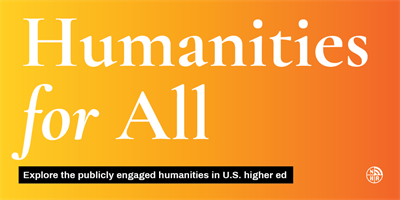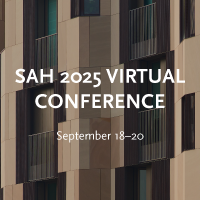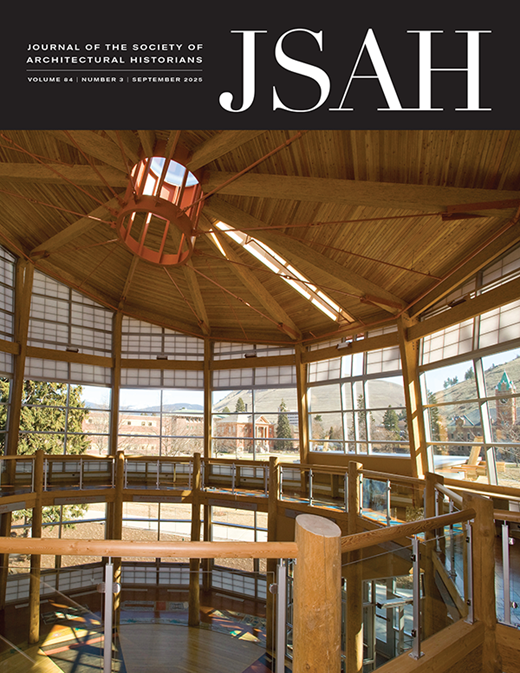-
Membership
Membership
Anyone with an interest in the history of the built environment is welcome to join the Society of Architectural Historians -
Conferences
Conferences
SAH Annual International Conferences bring members together for scholarly exchange and networking -
Publications
Publications
Through print and digital publications, SAH documents the history of the built environment and disseminates scholarship -
Programs
Programs
SAH promotes meaningful engagement with the history of the built environment through its programs -
Jobs & Opportunities
Jobs & Opportunities
SAH provides resources, fellowships, and grants to help further your career and professional life -
Support
Support
We invite you to support the educational mission of SAH by making a gift, becoming a member, or volunteering -
About
About
SAH promotes the study, interpretation, and conservation of the built environment worldwide for the benefit of all
Humanities for All: Scholarly Societies Column
Aug 29, 2018
by
Daniel Fisher, Project Director, National Humanities Alliance

As campuses across the country fill with the renewed energy of the fall semester, it is a good time to pause to reflect on how we make the case for the value of the humanities at institutions of higher education. The question is particularly pressing in light of newly-released data from the Pew Research Center that shows that roughly six-in-ten Americans (61 percent) believe U.S. higher education is “headed in the wrong direction.” Among a range of concerns, 73 percent of Republicans and 56 percent of Democrats believe that students are not being prepared to succeed in the workplace.
While the Pew survey was not focused on the humanities specifically, its results highlight the challenges that advocates for the humanities in higher education face today. To combat concerns about preparation for the workforce, we can and should show that studying the humanities cultivates critical skills that have led to success in a wide range of career paths—with strong earnings and high levels of job satisfaction. It is also important to show that the benefits of studying the humanities extend beyond the market—facilitating engaged citizenship and a life well-lived.
At the same time, the Pew survey results point to a more general need to reframe the conversation about the value and direction of higher education: to make the claim that higher education institutions serve not just individual students but also, and increasingly, their surrounding communities. Case-making for the humanities should include rich examples of how publicly-oriented humanities projects enrich life in the U.S.: building and strengthening communities; creating innovative and practical learning experiences for students and people of all ages and backgrounds; and broadening our understanding of ourselves, our nation, and our world.
To highlight the public impact of the humanities in higher education, the National Humanities Alliance recently launched Humanities for All: a website that documents the past 10 years of publicly engaged humanities research, teaching, and programming in universities and colleges across the U.S. The website presents a cross section of over 1,400 projects, searchable, sortable, and illustrated with 51 in-depth profiles. When viewed together, these initiatives illustrate the broad impact of the humanities beyond higher education.
Humanities for All not only seeks to broaden narratives about the humanities in higher education but also to deepen the practice of public engagement in the humanities. We at NHA have a stake in encouraging more of this work, which provides more opportunities for members of the public to have humanities experiences and appreciate the significance of the humanities in higher education. In addition, when integrated into coursework, engaged humanities projects can provide meaningful and practical learning experiences that prepare students for the workforce. To this end, we present these examples as a resource for all who would like to begin or deepen their practice of public engagement.
Examples of engagement abound in architectural history and allied fields, all of which can inform our humanities case-making and practice.
The Society of Architectural Historians’ very own SAH Archipedia is an online encyclopedia of U.S. architecture and landscapes, presenting peer-reviewed essays, photos, and maps for sites and structures in all 50 states. A 2016 National Endowment for the Humanities grant is helping to make this resource open access and freely available online to anyone interested in learning more about the history of America’s built environment.
In Indianapolis, Indiana, faculty and students from Indiana University-Purdue University Indianapolis have preserved historic Bethel AME Church records and architecture through digitization, including a virtual 3D walkthrough available to all online.


